China knows it is on safe ground toying with The U.S. So much easier than messing with, say, Russia. Remember, if an Obama-like thing had been "president" instead of Kennedy Fidel Castro would still be our "president for life".
Navigation
Install the app
How to install the app on iOS
Follow along with the video below to see how to install our site as a web app on your home screen.

Note: This feature currently requires accessing the site using the built-in Safari browser.
More options
You are using an out of date browser. It may not display this or other websites correctly.
You should upgrade or use an alternative browser.
You should upgrade or use an alternative browser.
Closer to Armageddon?; China talking war with the US
- Thread starter Anonymous1977
- Start date
- Aug 16, 2011
- 128,082
- 24,169
- 2,180
Don't worry
Not worried, as a Christian man...but Armageddon/a World War would be a dreadful event.
Maybe you misunderstood "don't worry."
Anonymous1977
(NOT AFFILIATED WITH GROUP CALLED, "ANONYMOUS")
- Thread starter
- #63
US troops to collide with Russian bombing?...WW3 here?:
US Special Forces deployed as ‘human shields’ to salvage terror assets in Syria
-
US Special Forces deployed as ‘human shields’ to salvage terror assets in Syria
-
ninja007
Gold Member
Quote from article: “I advise the US not to make a fool out of themselves in trying to be smart” - China foreign ministry spokesperson
South China Sea: Beijing 'not frightened to fight a war' after US move
except if you understood the bible armegeddon isnt about us vs china. I'll give you a hint. Israel.
Anonymous1977
(NOT AFFILIATED WITH GROUP CALLED, "ANONYMOUS")
- Thread starter
- #66
except if you understood the bible armegeddon isnt about us vs china. I'll give you a hint. Israel.
Lol I know what Armageddon is about...it's about everyone on earth...
-
What's it all about, Spratly?...
How China's artificial islands led to tension in the South China Sea
Oct 27, 2015 - Beijing is attempting to build artificial islands, while other states in the region are looking to the US to flex its military muscle on their behalf
How China's artificial islands led to tension in the South China Sea
Oct 27, 2015 - Beijing is attempting to build artificial islands, while other states in the region are looking to the US to flex its military muscle on their behalf
What’s the story?
Over the last two years China has dramatically stepped up land reclamation work on reefs and atolls it claims in the Spratly Island chain in the South China Sea, also claimed by the Philippines, Taiwan, Malaysia, Vietnam and Brunei. Chinese ships have been dredging new harbours, while cranes have been erected in an attempt to build artificial islands atop submerged reefs. There is evidence of airstrips being built. The US has protested that the work is illegal and destabilising and for months the Pentagon has been pushing the White House to take a firmer stance.
Washington has said it will ignore any Chinese claim for territorial waters based on new man-made islands, and has flown a surveillance plane with television crews to film the dredging work, sparking bitter Chinese complaints and dark talk in the Chinese press about a coming conflict. On Tuesday, the US upped the ante once again by deploying a warship to sail through a 12-nautical mile zone around two artificial islands in the archipelago. China responded by accusing the US of “provocative actions” – but there was no immediate sign of any military response from Beijing.
How did this happen?
Control over the South China Sea and its reefs has swung violently over the centuries with the rise and fall of empires, leaving the issue of ownership in the 21st century hazy at best. China’s claims on the Spratlys and the Paracel islands to the north, are based more on historic settlement rather than geographical proximity. As the regime in Beijing has built up its long-distance “blue water” navy it has become increasingly assertive, bolstering its claims with accelerating construction work, and shrugging off calls for a regional negotiation settlement on the Spratlys’ future.
MORE
ninja007
Gold Member
except if you understood the bible armegeddon isnt about us vs china. I'll give you a hint. Israel.
Lol I know what Armageddon is about...it's about everyone on earth...
-
no its not. Not at all. Its Israel vs her enemies. Youre mixing a specific battle with God's judgements/vials/horns etc...
Anonymous1977
(NOT AFFILIATED WITH GROUP CALLED, "ANONYMOUS")
- Thread starter
- #69
no its not. Not at all. Its Israel vs her enemies. Youre mixing a specific battle with God's judgements/vials/horns etc...
"(13)Then I saw three impure spirits that looked like frogs; they came out of the mouth of the dragon, out of the mouth of the beast and out of the mouth of the false prophet. (14)They are demonic spirits that perform signs, and they go out to the kings of the whole world, to gather them for the battle on the great day of God Almighty. (15)'Look, I come like a thief! Blessed is the one who stays awake and remains clothed, so as not to go naked and be shamefully exposed.' (16)Then they gathered the kings together to the place that in Hebrew is called Armageddon." Rev. 16:13-16, NIV
-
Anonymous1977
(NOT AFFILIATED WITH GROUP CALLED, "ANONYMOUS")
- Thread starter
- #70
U.S. Defense Watch: Germany moving toward civil war? ...
Is Germany heading toward massive civil strife?
-
Is Germany heading toward massive civil strife?
-
What we got here, is a Mexican Standoff...
US, Chinese navies agree to maintain dialogue to avoid clashes
Oct 29th 2015 - The Chinese and U.S. navies held high-level talks on Thursday after a U.S. warship challenged China's territorial assertions in the South China Sea, and a U.S. official said both sides agreed to maintain dialogue and follow protocols to avoid clashes.
See also:
For US, Pacific showdown with China a long time coming
Oct 28, 2015 -- Tensions in the South China Sea reached a new high on Oct. 27, when the U.S. Navy sent a guided-missile destroyer, the USS Lassen, within 12 nautical miles of artificial islands built and claimed by China. Recent moves by the Navy and statements by its highest-ranking officers show that preparations for the exercise -- and for an eventual showdown over the West Pacific -- had been in the works for months.
Related:
Beijing Closes In on Vietnam’s ‘China Beach’
10.29.15 - As U.S. warships challenge China’s expansion in the South China Sea, Vietnam moves ever closer to America.
US, Chinese navies agree to maintain dialogue to avoid clashes
Oct 29th 2015 - The Chinese and U.S. navies held high-level talks on Thursday after a U.S. warship challenged China's territorial assertions in the South China Sea, and a U.S. official said both sides agreed to maintain dialogue and follow protocols to avoid clashes.
After the talks between U.S. chief of naval operations Admiral John Richardson and his Chinese counterpart, Admiral Wu Shengli, scheduled port visits by U.S. and Chinese ships and planned visits to China by senior U.S. Navy officers remained on track, the official said. "None of that is in jeopardy. Nothing has been cancelled," said the official. Both officers also agreed on the need to stick to protocols established under the Code for Unplanned Encounters at Sea. "They agreed that it's very important that both side continue to use the protocols under the CUES agreement when they're operating close to keep the chances for misunderstanding and any kind of provocation from occurring," said the official.
The talks, by video teleconference, were called to calm tensions after Beijing rebuked Washington for sending a guided-missile destroyer within 12 nautical miles of one of China's man-made islands in the South China Sea's Spratly archipelago on Tuesday. A U.S. Navy spokesman underscored Washington's position that U.S. freedom of navigation operations were meant to "protect the rights, freedoms, and lawful uses of the sea and airspace guaranteed to all nations under international law."
There was no immediate comment from China on the talks, which the U.S. official said lasted more than an hour. A spokesman for China's Ministry of Defense said earlier that Wu would present Beijing's "solemn position on the U.S. vessel's entry without permission" into waters in the South China Sea. "We would urge the U.S. side not to continue down the wrong path," Defence Ministry spokesman Yang Yujun said. "But if they do, we will take all necessary measures in accordance with the need." China suffered a setback on Thursday in its broad territorial claims in the South China Sea when an arbitration court in The Hague said it had jurisdiction to hear some territorial claims the Philippines filed against China.
MORE
See also:
For US, Pacific showdown with China a long time coming
Oct 28, 2015 -- Tensions in the South China Sea reached a new high on Oct. 27, when the U.S. Navy sent a guided-missile destroyer, the USS Lassen, within 12 nautical miles of artificial islands built and claimed by China. Recent moves by the Navy and statements by its highest-ranking officers show that preparations for the exercise -- and for an eventual showdown over the West Pacific -- had been in the works for months.
The "freedom of navigation" exercise is Washington's most significant challenge to China to date and can be taken as a blunt statement to the world that the U.S. does not recognize Beijing's territorial claims. A Chinese Foreign Ministry spokesman issued an angry rebuke, saying "relevant authorities" monitored, followed and warned the USS Lassen as it "illegally" entered waters without the Chinese government's permission.
Clear message
Under international law, a country's territorial waters extend 12 nautical miles from its shore. Technically, however, the recent U.S. exercise does not infringe upon the sovereignty of the maritime features. The two reefs that the Lassen approached -- Subi and Mischief -- are completely man-made, as opposed to some of the other artificial islands that have some rocks above water. Under the United Nations Convention on the Law of the Sea, low-tide elevations -- land that is above water at low tide but submerged at high tide -- cannot be used as a basis to claim maritime space.
Despite the legal tiptoeing, the intent of the mission is clear. The Obama administration wants China to halt construction of the seven artificial islands in disputed waters. Chinese Foreign Minister Wang Yi said in August that the construction had stopped. Satellite images, however, show significant activity going on in the area, particularly to add finishing touches to the surface of the islands. The U.S. is expected to intensify its navigation exercises if these activities continue.
MORE
Related:
Beijing Closes In on Vietnam’s ‘China Beach’
10.29.15 - As U.S. warships challenge China’s expansion in the South China Sea, Vietnam moves ever closer to America.
DA NANG, Vietnam — The 20 miles of white sand that is My Khe Beach used to be a destination for American soldiers in Vietnam seeking rest and recreation. As it happened, the GI’s called it “China Beach.” In the decades since, amid the rapid modernization of Vietnam, Da Nang has become a popular international tourist destination. During China’s boom years, Vietnam’s tourism industry was bolstered by masses of Chinese visitors. The People’s Republic has the world’s largest middle class, and those with a little cash to flash are eager to enjoy the trappings of new locales.
Indeed, Da Nang looks a little like a third-tier Chinese city, with constant construction kicking up dust, and huge trucks barreling down wide boulevards along the coastline, but the traces of French colonial architecture and generally laidback vibes warrant a stay lasting a day or two. Chinese tourists, often entire families traveling with a package, would stop off before moving on to the next city. That has changed. And once again a vague specter of war hangs on the horizon like a distant but threatening storm.
As China expands its military presence and territorial claims in the South China Sea, it is being challenged, not least, by the United States. This week, a U.S. guided missile destroyer sailed within 12 miles of an artificial reef being built far out in the water, an intentionally provocative American move that Beijing labeled “extremely irresponsible.” But the real weight of these confrontations falls on the smaller countries along the Sea’s littoral. Nowhere has that been more apparent than in Vietnam.
In May 2014, after completing a drilling assignment, an oil rig operated by state-owned China Oilfield Services Ltd. was parked near Vietnam’s coast. The vessel occupied an area of the South China Sea that was under territorial dispute—the Chinese government claimed the oil rig was merely stopping in China’s own backyard, while their Vietnamese counterparts said the oil rig did not have permission to enter those waters. Vietnamese patrol boats chased the oil rig around. This kicked off a series of anti-China riots in Vietnam, where protestors attacked and burned factories mostly owned, in fact, by Taiwanese companies.
MORE
Last edited:
Rhetoric gettin' hot in the South China Sea...
US defense chief warns of conflict in S. China Sea
November 7, 2015 - US Defense Secretary Ashton Carter on Saturday warned that land reclamation efforts and a military buildup in the South China Sea could lead to conflict between nations in the region.
See also:
US Sends B-52s Near Islands Claimed by China
November 13, 2015 - U.S. defense officials say two B-52 bombers flew near contested islands in the South China Sea earlier this week, and received a verbal warning from Chinese ground controllers in the latest instance of Washington challenging Beijing's expansive territorial claims there.
US defense chief warns of conflict in S. China Sea
November 7, 2015 - US Defense Secretary Ashton Carter on Saturday warned that land reclamation efforts and a military buildup in the South China Sea could lead to conflict between nations in the region.
Speaking at a defense forum at the Ronald Reagan Presidential Library in California, the Pentagon chief also said America was adapting its military posture to counter increased Russian "aggression." Appearing on the final leg of an eight-day trip that included meetings with defense ministers from several nations in the Asia-Pacific region, Carter said his concerns about the frantic pace of land reclamation in the South China Sea were broadly shared. "The United States joins virtually everyone else in the region in being deeply concerned about the pace and scope of land reclamation in the South China Sea," Carter told an audience of senior defense figures.
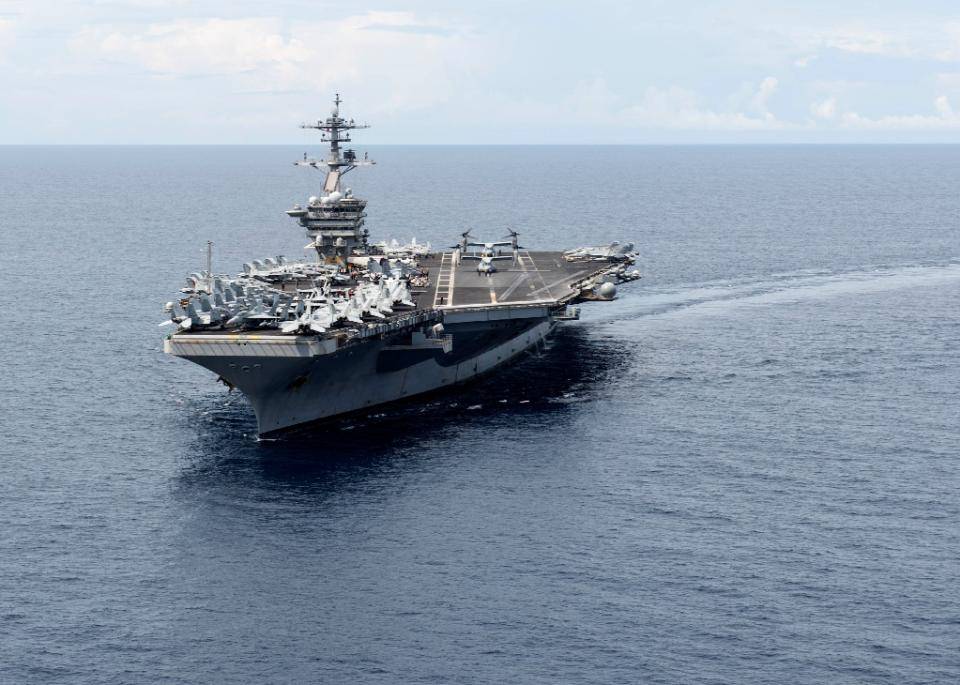
Two MV-22 Ospreys as they land on the flight deck of the aircraft carrier USS Theodore Roosevelt
Carter added he was worried about "the prospect of further militarization, as well as the potential for these activities to increase the risk of miscalculation or conflict among claimant states." The Reagan National Defense Forum is an annual event that sees dozens of America's top defense figures -- including politicians from both political parties -- discuss America's defense policies.
Carter used his platform to take a swipe at recent Russian military moves. "At sea, in the air, in space and in cyberspace, Russian actors have engaged in challenging activities," he said. "And, most disturbing, Moscow's nuclear saber-rattling raises questions about Russian leaders' commitment to strategic stability, their respect for norms against the use of nuclear weapons and whether they respect the profound caution nuclear-age leaders showed with regard to the brandishing of nuclear weapons."
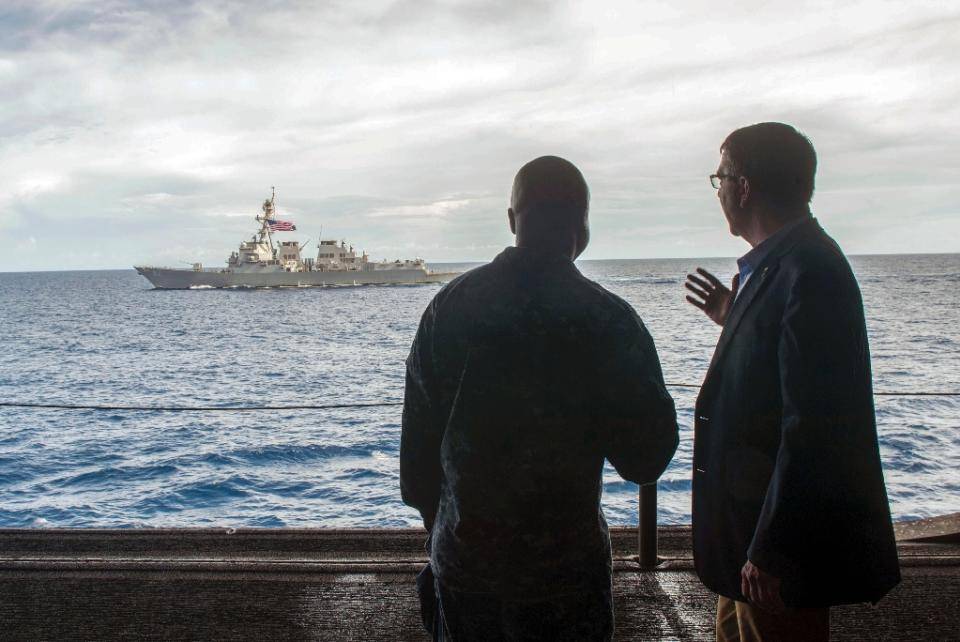
US Secretary of Defense Ashton Carter (R) as he speaks with Cmdr. Robert C. Francis Jr. during a visits to the USS Theodore Roosevelt
In an echo of some of Reagan's own attempts to use technology to counter a Soviet nuclear threat, Carter talked up some of America's new high-tech weaponry, including an electromagnetic railgun that can fire projectiles at an astonishing 4,500 miles (7,250 kilometers) per hour.
- 'Surprising' new technologies -
See also:
US Sends B-52s Near Islands Claimed by China
November 13, 2015 - U.S. defense officials say two B-52 bombers flew near contested islands in the South China Sea earlier this week, and received a verbal warning from Chinese ground controllers in the latest instance of Washington challenging Beijing's expansive territorial claims there.
The bombers, which originated from and returned to a U.S. air base on Guam, conducted a "routine mission in international airspace in the vicinity of the Spratly Islands" on November 8 and 9, according to Commander Bill Urban, a Pentagon spokesman on Thursday. The planes "received two verbal warnings from a Chinese ground controller despite never venturing within 15 nautical miles [28 kilometers] of any feature," Urban said. "Both aircraft continued their mission without incident, and at all times operated fully in accordance with international law." Pentagon Press Secretary Peter Cook also confirmed the flight, which he said was not out of the ordinary. "I know we conduct B-52 flights in international airspace in that part of the world all the time," he said during a press conference Thursday.
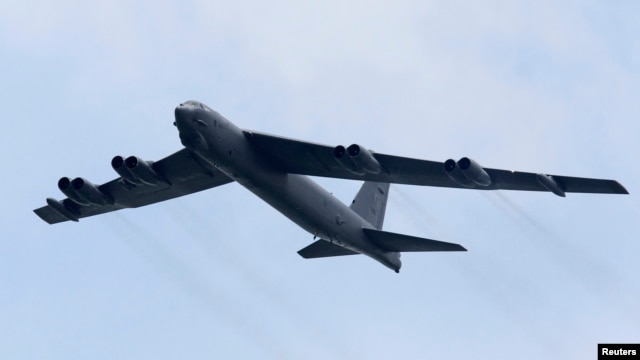
A B-52 strategic bomber from the United States Air Force. Bombers flying near contested islands received a verbal warning from Chinese ground controllers.
The U.S. military has been ramping up what it calls routine "freedom of navigation" operations in the South China Sea, where Beijing has competing territorial claims with Brunei, Malaysia, the Philippines, Taiwan and Vietnam. In the boldest U.S. move yet, the USS Lassen last month sailed within 11 kilometers of the Subi Reef in the Spratly Island archipelago. Beijing launched a massive building project last year to transform the submerged reefs into islands that can support runways and other facilities. The artificial island building project has outraged China's neighbors who are concerned Beijing will use the facilities in part to enforce its disputed claims to the area. The U.S. has called on China to stop the island-building.
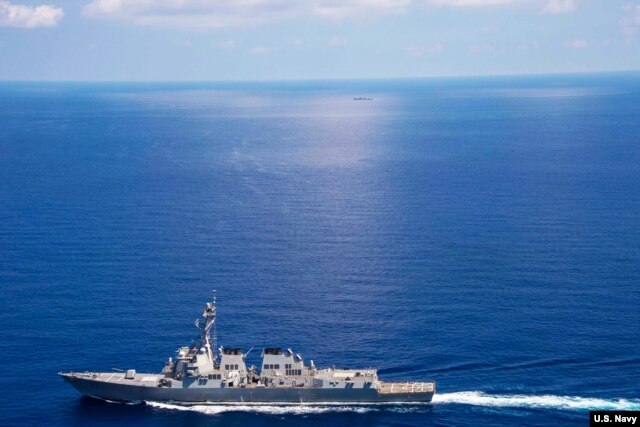
USS Lassen (DDG 82) operates in international waters near the Chinese People's Liberation Army (Navy) Jianghu V-class frigate Dongguan (560) while on patrol in U.S. 7th Fleet at South China Sea
The maritime tensions are expected to be a major focus next week when U.S. President Barack Obama travels to the region to meet with regional leaders at a pair of Asia-Pacific summits. Although Washington says it does not take an official position on the territorial disputes, U.S. leaders routinely slam Chinese territorial claims in the South China Sea and have developed closer military ties with many of China's rival claimants.
US Sends B-52s Near Islands Claimed by China
Last edited:
Throwin' down the gauntlet...
China can't stop U.S. naval operations, Pacific Fleet commander says
Dec. 15, 2015 - Adm. Scott Swift said he is concerned that decades of peace and prosperity in the Asia-Pacific could be marred by a return to a "might makes right" approach.
China can't stop U.S. naval operations, Pacific Fleet commander says
Dec. 15, 2015 - Adm. Scott Swift said he is concerned that decades of peace and prosperity in the Asia-Pacific could be marred by a return to a "might makes right" approach.
U.S. Pacific Fleet commander Adm. Scott Swift said China should pursue arbitration in South China Sea disputes, and if tensions escalate, an arms race could ensue. Speaking at the Cooperative Strategy Forum held at the Asia Pacific Center for Security Studies in Honolulu, Swift said China's military buildup in the disputed Spratly Islands has not stopped the U.S. Pacific Fleet from carrying on operations, Stars and Stripes reported Monday. "I'm interested — potentially to the point of fascination — about the element of militarization, but the fact of the matter is that it's not going to make any difference to my operations," Swift said.
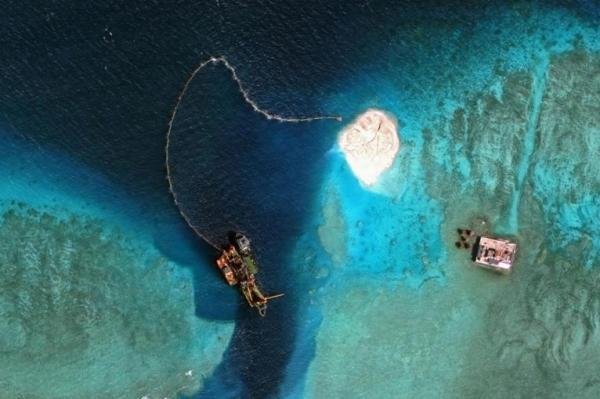
U.S. Pacific Fleet commander Adm. Scott Swift said Monday China’s military buildup in the disputed Spratly Islands has not stopped the U.S. Pacific Fleet from carrying on operations.
Swift added that he is concerned that decades of peace and prosperity in the Asia-Pacific could be marred by a return to a "might makes right" approach to the region, Kyodo News reported. The Pacific Fleet commander said China has relied on sheer force to realize its territorial claims, and that it is pursuing a course of action that could lead to an arms race. China's neighbors have disputed Beijing's claims and are at odds with its land reclamation activities. The Philippines has requested the Permanent Court of Arbitration in The Hague to uphold its sovereign right to areas within 200 nautical miles of the Philippine coast. China has refused to seek arbitration, and has insisted the issue be resolved bilaterally.
Beijing has denied the islands are being militarized, despite evidence from satellite images that indicated it has been building airstrips or runways and constructing radars for surveillance. Swift said Tuesday that even if the islands "were militarized, I don't think that would change the United States' approach or the Pacific Fleet's approach...than if they weren't militarized." The U.S. commander said he also would be unconcerned if China declared an Air Defense Identification Zone. "It's not an exclusion zone; it's an identification zone," he said.
China can't stop U.S. naval operations, Pacific Fleet commander says
Anonymous1977
(NOT AFFILIATED WITH GROUP CALLED, "ANONYMOUS")
- Thread starter
- #74
Wouldn't know if "Armageddon" is here or not...but hopefully there is no Armageddon and if there is, hopefully it isn't here... 
-
-
Throwin' down the gauntlet...
China can't stop U.S. naval operations, Pacific Fleet commander says
Dec. 15, 2015 - Adm. Scott Swift said he is concerned that decades of peace and prosperity in the Asia-Pacific could be marred by a return to a "might makes right" approach.
U.S. Pacific Fleet commander Adm. Scott Swift said China should pursue arbitration in South China Sea disputes, and if tensions escalate, an arms race could ensue. Speaking at the Cooperative Strategy Forum held at the Asia Pacific Center for Security Studies in Honolulu, Swift said China's military buildup in the disputed Spratly Islands has not stopped the U.S. Pacific Fleet from carrying on operations, Stars and Stripes reported Monday. "I'm interested — potentially to the point of fascination — about the element of militarization, but the fact of the matter is that it's not going to make any difference to my operations," Swift said.

U.S. Pacific Fleet commander Adm. Scott Swift said Monday China’s military buildup in the disputed Spratly Islands has not stopped the U.S. Pacific Fleet from carrying on operations.
Swift added that he is concerned that decades of peace and prosperity in the Asia-Pacific could be marred by a return to a "might makes right" approach to the region, Kyodo News reported. The Pacific Fleet commander said China has relied on sheer force to realize its territorial claims, and that it is pursuing a course of action that could lead to an arms race. China's neighbors have disputed Beijing's claims and are at odds with its land reclamation activities. The Philippines has requested the Permanent Court of Arbitration in The Hague to uphold its sovereign right to areas within 200 nautical miles of the Philippine coast. China has refused to seek arbitration, and has insisted the issue be resolved bilaterally.
Beijing has denied the islands are being militarized, despite evidence from satellite images that indicated it has been building airstrips or runways and constructing radars for surveillance. Swift said Tuesday that even if the islands "were militarized, I don't think that would change the United States' approach or the Pacific Fleet's approach...than if they weren't militarized." The U.S. commander said he also would be unconcerned if China declared an Air Defense Identification Zone. "It's not an exclusion zone; it's an identification zone," he said.
China can't stop U.S. naval operations, Pacific Fleet commander says
Sounds like back pedaling to me
-Geaux
China's neighbors seeking help from Washington...
China taking 'self-isolating' steps in South China Sea: Pentagon
Fri Jan 22, 2016 | The United States is not looking for conflict with China but steps it is taking in the South China Sea are self-isolating and prompting other countries to seek help from Washington, U.S. Defense Secretary Ashton Carter said on Friday.
China taking 'self-isolating' steps in South China Sea: Pentagon
Fri Jan 22, 2016 | The United States is not looking for conflict with China but steps it is taking in the South China Sea are self-isolating and prompting other countries to seek help from Washington, U.S. Defense Secretary Ashton Carter said on Friday.
"I'm not one of those people who believes conflict between the United States and China is inevitable, it's certainly not desirable, I don't think it's likely," Carter said at the World Economic Forum in Davos.

Chinese dredging vessels are purportedly seen in the waters around Mischief Reef in the disputed Spratly Islands in the South China Sea in this still image from video taken by a P-8A Poseidon surveillance aircraft provided by the United States Navy
"We don't seek to ask people to take sides. We do know that people are coming to us increasingly. Why is that? It is because China is taking some steps that I fear are self-isolating, driving towards a result that none of us wants," he said, in reference to Chinese measures in the South China Sea.
China taking 'self-isolating' steps in South China Sea: Pentagon
Granny says, "Dat's right - we whupped Japan inna Pacific inna Big One...
US Navy Warns Against Chinese Flights in South China Sea
February 15, 2016 - A senior U.S. naval officer says it would be destabilizing if China tries to fly jet fighters from its new man-made islands in the South China Sea.
See also:
Defending Taiwan seen as crucial
Thu, Feb 11, 2016 - Washington’s need to defend Taiwan from a Chinese attack is greater today than it was 30 years ago, a leading US military strategist said on Tuesday.
US Navy Warns Against Chinese Flights in South China Sea
February 15, 2016 - A senior U.S. naval officer says it would be destabilizing if China tries to fly jet fighters from its new man-made islands in the South China Sea.
Vice Admiral Joseph Aucoin, the commander of the U.S. Navy's Seventh Fleet, told reporters Monday in Singapore that any attempt by China to fly military aircraft from the islands would not deter U.S. flights over the area. "We will fly, sail and operate wherever international law permits, and that includes flying over that airspace," he said. "We're not being provocative here," Aucoin added. "We are just exercising our rights and freedom according to international law, and we will continue to do this. It will benefit all countries no matter their size and strength."
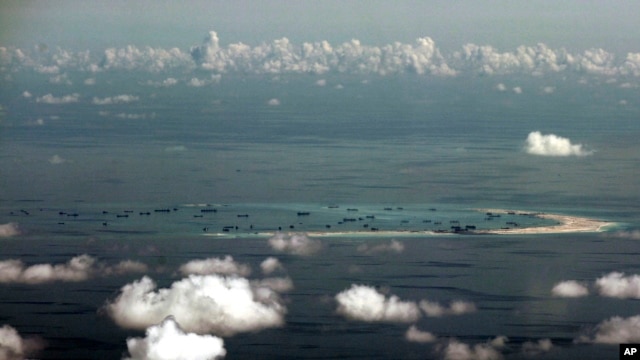
Aerial photo shows China's alleged ongoing reclamation of Mischief Reef in the Spratly Islands, South China Sea
Aucoin said he does not know when China might start flying fighter-type aircraft from the disputed Spratly archipelago, where China has created artificial islands and a 3,000-meter runway. When asked about the impact of possible Chinese jet fighter patrols, Aucoin said "it's a destabilizing uncertainty." He urged China to make its intentions for the South China Sea better known, saying it would relieve some of the "angst" that countries are expressing.
Aucoin's comments come amid a two-day summit in California between President Barack Obama and leaders from Southeast Asian nations. The issue of the South China Sea is expected to be high on the agenda. China claims much of the South China Sea, while several other nations, including the Philippines, Taiwan and Vietnam, have rival claims.
US Navy Warns Against Chinese Flights in South China Sea
See also:
Defending Taiwan seen as crucial
Thu, Feb 11, 2016 - Washington’s need to defend Taiwan from a Chinese attack is greater today than it was 30 years ago, a leading US military strategist said on Tuesday.
“Taiwan is everything we preach about — it is what we want other countries to be,” said Thomas McNaugher, director of studies at Georgetown University’s Center for Security Studies. Invading Taiwan would be an “extremely dicey” operation, McNaugher told an Atlantic Council discussion titled “Conflict in the Taiwan Strait?” Amphibious assaults are very tough and China does not have any particular experience in that area, he said. Rather than a direct attack, Beijing might try a blockade if it decided to force unification, he said. However, a blockade would take a lot of time to enforce and that would allow US power to build up “pretty effectively,” he said.
McNaugher said that China’s military buildup has been very effective and comprehensive, and Beijing was continuing to make “steady, relentless progress.” He said the US still had an edge in the conventional balance of power, but that “we have entered that fuzzy area where there is a lot of uncertainty about how this would go.” In case of an attack, US intervention would depend on how the hostilities started, McNaugher said. “Taiwan is a raucous democracy; they even have fist fights in the legislature. It has a great economy with great human rights,” he said. “If we were to let Taiwan go to a rapacious and naked Chinese attack, not only would it destroy the global economy, it would undermine our credibility.”
On the other hand, if a war started because Taiwan “promotes it,” there would be a real question about US support, he said. The message to the Taiwanese was that in case of a conflict with China they had to be the victims and not the promoters, he said. One way for Taiwan to avoid an attack would be for it to “very visibly” build up its ability to defend itself and increase the level of deterrence, he said. In related news, Walter Lohman, director of the Asian Studies Center at the Washington-based Heritage Foundation, said in a new paper that the US should clarify its support for Taiwan.
As “carefully and responsibly” as president-elect Tsai Ing-wen and the Democratic Progressive Party (DPP) might approach relations with China, they nevertheless fundamentally rejected Beijing’s dream of ultimate unification, and this would remain an underlying source of tension as long as the DPP remains in power, he wrote. US President Barack Obama’s administration should establish “unwavering support” for Taiwan’s security and prerogative in determining its own future, Lohman said. “To this end, the administration should facilitate new arms sales, or, failing this, at least begin building interagency consensus and support on Capitol Hill and Taipei to facilitate approval early in 2017,” he wrote. “New fighter jets and diesel-electric submarines should be at the top of the list,” he added.
Defending Taiwan seen as crucial - Taipei Times
Asian countries are increasingly pushing back against China’s bullying tactics...
Tensions Rise in the South China Sea
APRIL 6, 2016 - Asian countries are increasingly pushing back against China’s sweeping territorial claims and bullying tactics in the South China Sea. On Sunday, a Japanese submarine made a port call in the Philippines for the first time in 15 years, a sign of growing security cooperation. Last week, Vietnam seized a Chinese ship for illegally entering its territorial waters, and Indonesia threatened to defend its own claims with F-16 fighter jets.
See also:
4-star admiral wants to confront China. White House says not so fast
April 6, 2016 - The U.S. military’s top commander in the Pacific is arguing behind closed doors for a more confrontational approach to counter and reverse China’s strategic gains in the South China Sea, appeals that have met resistance from the White House at nearly every turn.
Tensions Rise in the South China Sea
APRIL 6, 2016 - Asian countries are increasingly pushing back against China’s sweeping territorial claims and bullying tactics in the South China Sea. On Sunday, a Japanese submarine made a port call in the Philippines for the first time in 15 years, a sign of growing security cooperation. Last week, Vietnam seized a Chinese ship for illegally entering its territorial waters, and Indonesia threatened to defend its own claims with F-16 fighter jets.
Meanwhile, President Obama used a meeting with President Xi Jinping last week to deliver what one administration official described as “a very direct and unvarnished earful” about how seriously Washington views China’s behavior. And on Monday the United States and the Philippines began annual war games that will certainly show that the Philippines can count on the United States to counter Beijing.
The South China Sea is rich in natural resources and serves as a vital waterway for $5 trillion in trade. The Chinese have been engaged in a campaign to transform contested reefs and rocks into artificial islands with airstrips and other military structures. This has alarmed neighboring countries, which have competing claims and fear that China will use these islands to interfere with navigation and other countries’ rights to fish and drill for oil and gas.
One result of the rising friction is a new defense agreement that will allow the United States to station weapons and troops at five bases in the Philippines for the first time in more than 20 years. Another is a marked increase in regional military spending. The United States recently carried out two patrols by warships and aircraft into territory claimed by China and is planning a third.
MORE
See also:
4-star admiral wants to confront China. White House says not so fast
April 6, 2016 - The U.S. military’s top commander in the Pacific is arguing behind closed doors for a more confrontational approach to counter and reverse China’s strategic gains in the South China Sea, appeals that have met resistance from the White House at nearly every turn.
Adm. Harry Harris is proposing a muscular U.S. response to China's island-building that may include launching aircraft and conducting military operations within 12 miles of these man-made islands, as part of an effort to stop what he has called the "Great Wall of Sand" before it extends within 140 miles from the Philippines' capital, sources say. Harris and his U.S. Pacific Command have been waging a persistent campaign in public and in private over the past several months to raise the profile of China's land grab, accusing China outright in February of militarizing the South China Sea.
But the Obama administration, with just nine months left in office, is looking to work with China on a host of other issues from nuclear non-proliferation to an ambitious trade agenda, experts say, and would prefer not to rock the South China Sea boat, even going so far as to muzzle Harris and other military leaders in the run-up to a security summit. “They want to get out of office with a minimum of fuss and a maximum of cooperation with China,” said Jerry Hendrix, a retired Navy captain and defense strategy analyst with the Center for a New American Security.
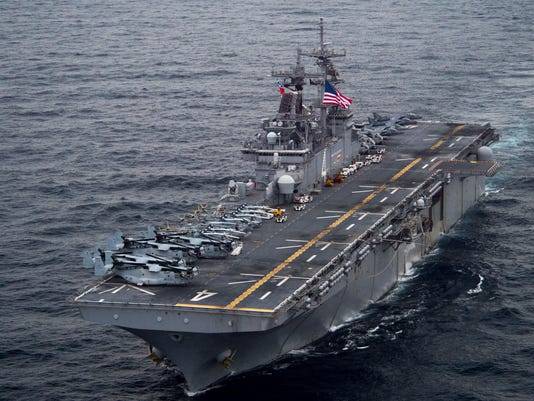
The White House has sought to tamp down on rhetoric from Harris and other military leaders, who are warning that China is consolidating its gains to solidify sovereignty claims to most of the South China Sea. National Security Adviser Susan Rice imposed a gag order on military leaders over the disputed South China Sea in the weeks running up to the last week's high-level nuclear summit, according to two defense officials who asked for anonymity to discuss policy deliberations. China's president, Xi Jinping, attended the summit, held in Washington, and met privately with President Obama.
The order was part of the notes from a March 18 National Security Council meeting and included a request from Rice to avoid public comments on China's recent actions in the South China Sea, said a defense official familiar with the meeting readout. In issuing the gag order, Rice intended to give Presidents Obama and Xi Jinping "maximum political maneuvering space" during their one-on-one meeting during the global Nuclear Summit held March 31 through April 1, the official said. “Sometimes it’s OK to talk about the facts and point out what China is doing, and other times it's not,” the official familiar with the memo said. “Meanwhile, the Chinese have been absolutely consistent in their messaging.”
MORE
Similar threads
- Replies
- 2
- Views
- 64
- Replies
- 13
- Views
- 151
- Replies
- 77
- Views
- 1K
- Replies
- 11
- Views
- 143
Latest Discussions
- Replies
- 177K
- Views
- 2M
- Replies
- 146
- Views
- 3K
Forum List
-
-
-
-
-
Political Satire 8040
-
-
-
-
-
-
-
-
-
-
-
-
-
-
-
-
-
-
-
ObamaCare 781
-
-
-
-
-
-
-
-
-
-
-
Member Usernotes 469
-
-
-
-
-
-
-
-
-
-

 may get interesting ehh ?? china needs to be dealt with someday .
may get interesting ehh ?? china needs to be dealt with someday .